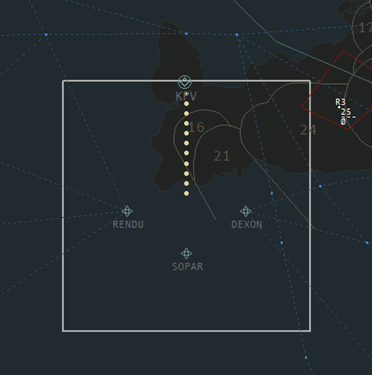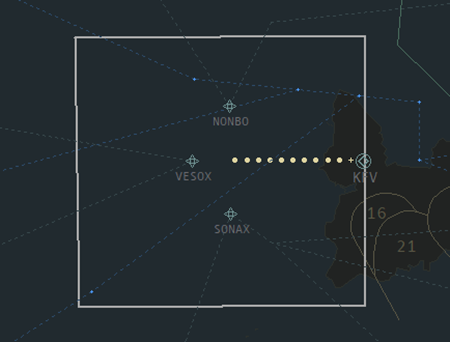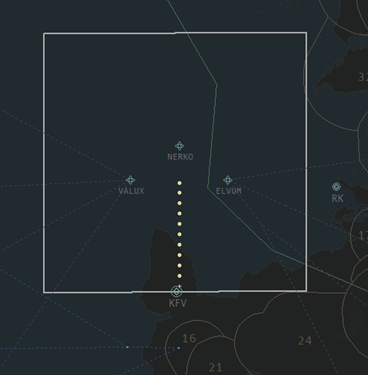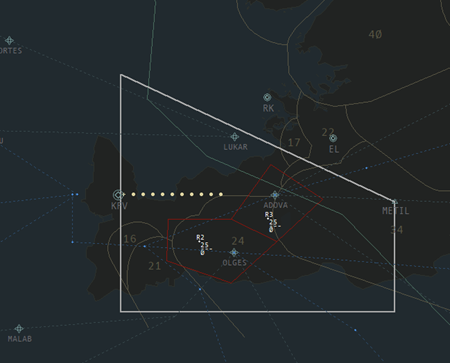Keflavik APP
Keflavik Approach (BIKF_APP) provides approach control service to all aircraft within the Keflavik (KF) sector of the Faxi TMA, and area control service to aircraft transiting the KF sector of the TMA. Keflavik APP also bandboxes the RK sector of the TMA when Reykjavik APP is offline.
Arrivals
|
INITIAL FIX |
RUNWAY |
|||
|
01 |
10 |
19 |
28 |
|
|
DEVUD |
4N |
4M |
2K |
1H |
|
NASBU |
4N |
2M |
3K |
1H |
|
ASRUN |
3N |
2M |
2K |
1H |
|
BASLU |
3N |
3M |
2K |
2H |
|
BIRNA |
2N |
3M |
3K |
2H |
|
ELDIS |
3N |
3M |
3K |
3H |
|
GIRUG |
3N |
3M |
2K |
2H |
|
INGAN |
5N |
3M |
2K |
2H |
Reykjavik Control clears aircraft for the STAR & descends them to FL100. If Reykjavik Control is offline, then APP may contact aircraft early (3-5 mins before they reach the first waypoint of the STAR) to issue STAR clearance and descent.
The standard approach for all runways is the ILS Z approach. BIKF's STARs are designed such that the last waypoint of the STAR is also one of the IAF of the ILS Z approach for that runway.
APP shall descend aircraft to cross the IAF at 3000ft if RWY 10/19 is in use, or 3500ft if RWY 01/28 is in use.
Traffic permitting, it is common practice for APP to cancel the STAR and clear aircraft directly to the IAF.
To ensure that no aircraft violates the minimum horizontal separation of 3 NM in the TMA, APP shall establish aircraft onto the ILS with no less than 5 NM separation. During single runway operations, APP should aim for 7 NM between arrivals, to ensure sufficient gaps for departures.
The ILS Z approaches have a published minimum speed of 160kts until 4 NM from the airport. APP may issue a higher/lower speed requirement, or cancel this speed restriction, as necessary for separation and sequencing.
Arrivals on the ILS Z or RNP approaches may be transferred to TWR as soon as they have passed the IAF. For any other approach, APP should wait until the aircraft is established on final approach track/course.
Missed Approach
TWR shall instruct aircraft to follow the standard missed approach, which is generally runway track to 3000ft (except for RWY 10, where it is runway track to D5.0 IKF and then left turn heading 328 climbing to 3000ft.)
If an aircraft is unable to fly the standard missed, TWR will instruct them to climb straight ahead to 3000ft.
TWR shall coordinate all missed approaches with APP prior to transferring them to APP.
Non-Standard Approaches
If aircraft are unable to accept the ILS Z approach, then alternative approaches should be offered in order of precision.
RNP & LOC Z
The published RNP & LOC Z approaches largely mirror the ILS Z approaches, and share the same published minimum speed of 160kts until 4 NM from the airport.
Vectored ILS
Aircraft on a vectored ILS approach into BIKF should be established no closer than 10 NM out.
ILS Y / VOR
The ILS Y and VOR approaches at BIKF are non-RNAV ILS procedures. They are teardrop-shaped procedures commencing from KFV VOR. Aircraft requesting these approaches should be cleared direct to KFV as soon as practical. After KFV, aircraft should report beacon outbound, and then established on the ILS/final approach course (as appropriate.)
Due to the added difficulty of sequencing aircraft on these procedures while the ILS Z/RNP approaches are also in use, it is preferred to vector aircraft onto the ILS instead of using these procedures.
Since the ILS Y and VOR approaches requires the aircraft to descend below 3000ft (into the BIKF CTR), APP should coordinate with Keflavik TWR to make them aware of any aircraft on such approaches.
NDB (RWY 10)
The NDB approach for RWY 10 is a racetrack procedure commencing from KF NDB. Aircraft may be cleared direct KF as soon as practical. The aircraft should be asked to report on final approach course, at which point it may be transferred to TWR.
Since the NDB approach requires the aircraft to descend below 3000ft (into the BIKF CTR), APP should coordinate with Keflavik TWR to make them aware of any aircraft on such approaches.
Departures
Traffic permitting, it is common practice for Approach to issue a direct to the last waypoint of the SID immediately after radar identifying the aircraft, even if said waypoints lie outside the TMA This does not require coordination with Reykjavik Control.
LVP Operations
When BIKF is in LVP, Keflavik Approach and Keflavik Tower should coordinate to revise the runway configuration so that the arrival runway is either RWY 10 or 19, as those are the only two CAT II equipped runways at BIKF. Approach should ensure additional spacing (at least +2 NM on top of usual minima) between aircraft.
Final Approach Position (BIKF_F_APP)
The Final Approach position (BIKF_F_APP, or Keflavik FIN) is intended to relieve the workload of the primary Approach position during high traffic. The coordination name of BIKF_F_APP is Keflavik Final, and its radio callsign is “Keflavik Approach.”
FIN controls the airspace immediately surrounding the extended centreline of BIKF’s active arrival runway. FIN's airspace ranges from 3000 – 7000ft. For RWY 01, 10, and 19, FIN's airspace is a large box, roughly 40 NM on each side, around the extended centreline. See the images below for reference.
| RWY 01 | RWY 10 |
 |
 |
| RWY 19 | RWY 28 |
 |
 |
When both Keflavik APP and Keflavik FIN are online, their division of responsibility is as follows:
- APP establishes the arrival sequence and descends aircraft to 7000ft.
- APP shall transfer arrivals to FIN at 7000ft when entering FIN's lateral boundaries.
- APP should generally vector arrivals onto a downwind for the arrival runway, with at least 10 NM in trail between each aircraft on downwind (or as otherwise agreed between APP & FIN.)
- If holding is necessary, APP will initiate and manage the holds.
- Final fine-tunes the sequence and directs aircraft onto final approach (the ILS).
Keflavik FinalFIN does not control departures, or controlprovide BIKFany top-down.down service for BIKF.
